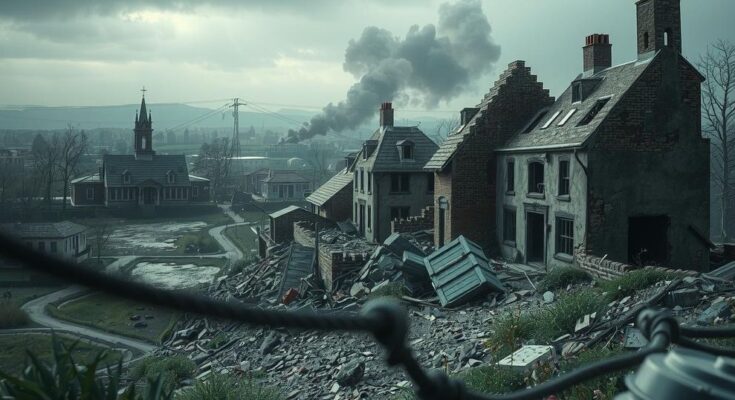The M23 rebel advance in Goma has resulted in widespread devastation, with families mourning deceased members. Injured victims, including children like Heshima, find refuge in overcrowded hospitals. Amidst claims of Rwandan support for the M23, everyday life resumes even as fear and human rights abuses persist. Many displaced individuals face a bleak future as they are forced from refugee camps under M23 demands.
In the Democratic Republic of Congo, the recent resurgence of M23 rebels has wreaked havoc, especially in Goma where young victims like 13-year-old Heshima have been left devastated. He suffers with a amputated leg, burns, and the loss of both parents in the conflict. Tantine, a relative, accuses the M23 rebels, supported by Rwanda, of decimating her family during clashes with the Congolese army (FARDC). As the M23 advances, they seize control over key cities, claiming to restore order in a region plagued by violence and instability.
Reports suggest that up to 4,000 Rwandan troops assist the M23, a claim denied by Kigali’s government. In Goma’s hospitals, medical staff endure overwhelming workloads, treating an influx of injured civilians daily. According to Myriam Favier from the International Committee of the Red Cross (ICRC), doctors have been working around the clock to manage a severe backlog of cases following the M23’s takeover of the city. The ICRC reported earlier incidents of looting of medical supplies, compounding their challenges.
Despite the struggle, some semblance of daily life resumes in Goma. Streets bustle with trade, devoid of visible M23 fighters as the community adapts to the new reality under rebel control. Residents express mixed feelings, as many self-censor their comments about the M23, wary of retaliation. Activists highlight a climate of fear, with one noting that the current time represents one of Goma’s most precarious periods.
M23’s rhetoric emphasizes peace and development; a newly appointed vice governor assured citizens of an era free from hunger and corruption. Yet, this contrasts sharply with the plight of thousands in refugee camps. Many are ordered to vacate the camps within 72 hours, provoking panic among displaced families who lack basic means for survival. Divine, a mother of two who resides in Bulengo camp, articulated the dire conditions faced by many as they prepare to leave.
Human rights organizations report increasing incidences of serious abuses by the M23, including allegations of shelling and killings. The complex conflict has historical roots connected to the aftermath of the Rwandan genocide. Critics assert that Rwanda’s interest in the Congo’s mineral resources contributes to tensions, risking a broader regional conflict. Unfortunately, the wealth of the country has rarely benefited its residents.
Among those displaced, Alphonsine shared her burdens as she prepared to leave for her destroyed home. She expressed uncertainty regarding survival after enduring significant hardship. The conflict continues to cast a long shadow, leaving countless families in despair as they face an uncertain future in the wake of violence and loss.
The humanitarian crisis in Goma reflects the devastating impact of the resurgence of M23 rebels and their control over the region. As families like Heshima’s suffer unimaginable losses, medical facilities struggle under the weight of conflict-related injuries. Despite the M23’s promises of peace, fear and uncertainty pervade the community. The ongoing violence, coupled with allegations of serious human rights abuses, hint at a bleak outlook for peace and stability in the Democratic Republic of Congo.
Original Source: www.bbc.com




